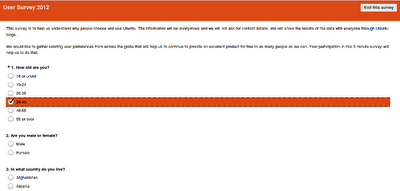| The 9th of March Canonical has posted a message on Twitter asking users around the world to participate in the user survey of Ubuntu (Ubuntu User Survey). |
The Ubuntu User Survey 2012 will help Canonical build a picture of how the Ubuntu operating system is used, shared and discovered.
The survey will only take 5 minutes of your precious time and all the information is completely anonymous; Canonical will not ask anyone for your contact details.
“This survey will help us understand why people choose and use Ubuntu. We would like to collect the preferences of current users around the world so that we can continue to offer a great free product to the maximum number of people, ”the survey page says.

too bad I didn't ask for unity
Hello, your blog seems very interesting! I also have a blog and I have loved the bar to share that stays at the top of the screen, how have you done that?
Thank you
I don't know how it looks, won't you remember the code? 😛
It must be deliberate, right?
It was "made by hand." You can look at the source code ...: O)
Cheers! Paul.
José, my apologies but I don't have time to look for it.
However, you can do it by following these steps:
1) I opened any blog post (because only on these pages does that bar appear).
2) Right click and select the option View source code.
3) What remains is to copy the corresponding source code.
Do not forget that it is not only the code of each of the buttons that you have to copy but also the styles applied to that entire area.
To copy the styles it is best to right click on the bar and select the Inspect Element option.
I'm sorry but this is currently all the help I can give. As you will see, it is a topic that is not copy-paste but rather that you have to do a little work that takes time. 🙁
Hug! Paul.
It is interesting that Diaspora is not listed in the social networks section.
And don't ask for Unity ¬¬ '
They are Canoni $ oft, they are interested in being from companies to be able to profit
If you wonder that they do not ask for Unity, do not be surprised, Ubuntu will remain faithful to Unity because Unity is the development that Ubuntu is committed to entering the world of mobiles and tablets.
If you wonder why Diaspora is not among social networks, do not be surprised, Diaspora was a boom at the beginning, but few talk about them, I even think they still continue with the invitation system, and now that Google+ has incorporated the news that Dispora brought It honestly doesn't seem like this network can ever take off. What did surprise me is that identi.ca did not appear.
regards
It seems that the survey is aimed at how they found out about Ubuntu and why they use it.
It's that he sends his nose to some, deifying shit and disqualifying other projects.
For all this I hate the ubunct
I do not understand why they bother that they do not ask for unity, totally who is holding people back to ubuntu with unity, so install another window manager and period, or are you annoying change distro, in particular I use gnome3 on the latest version of ubuntu period. Greetings Pablo.
I find the following interesting ... One of the users who have commented on this post, has a firm position against Ubuntu, even so he has a blog that deals with GNU / Linux, in it he has a tag cloud, in that cloud of labels the third label with the most entries guess what it is… UBUNTU !!!! With «110 themes»… Above other tags such as Debian (86), ArchLinux (39), GNU / Linux (54), Fedora (14), Linux (72) and Linux Mint (40)…
This catches my attention, because the popularity of Ubuntu instead of being celebrated by the community turns out that it has had an adverse effect on many Linuxeros, they accuse it mainly of seeking profit and that leads me to wonder, What about Red Hat? What was Solaris? From SuSE Enterprise? To name a few of a large number of Distros that have had a for-profit company behind them.
Ubuntu as well as many Distros is another one of an incredible range of possibilities of the GNU / Linux world with its own philosophy and its own mechanics. Don't you like Ubuntu? You have HUNDREDS of other free distributions. Do you like Ubuntu but don't like Unity? Install the manager you want (the most popular are in the repositories).
I would like to call for reflection, the Distro War is the greatest stupidity that GNU / Linux users can do, the Distros are simple variations of the same kernel and as a free community we are free of many things, including defending our favorite distro, but BY GOD, there is no need to attack a particular distro or its users, respect makes us civilized and mature people.
Discussing intelligently seems excellent to me, insulting a distro on a blog while sharing with colleagues who give the news of that same distro on your own blog, I find it hypocritical and disrespectful to your own colleagues.
Excuse me throughout the comment, I hope you reflect a little 😉
Survey done, even though I don't use ubuntu anymore. It was the one that finally prompted me to launch into Linux. So many changes and especially unity, made me look at other distros. (arch linux use now).